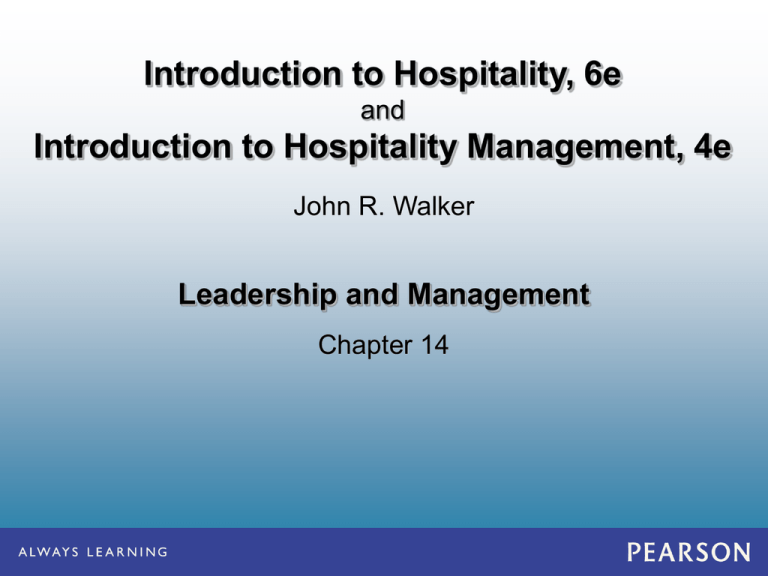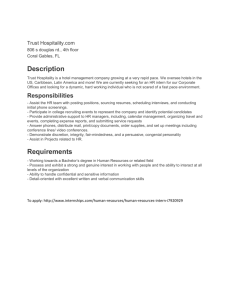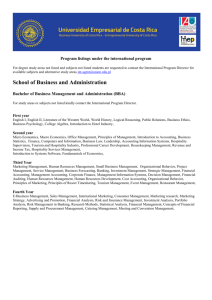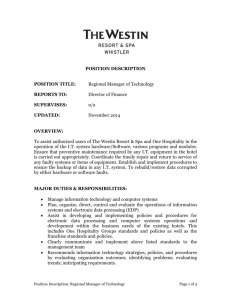
Introduction to Hospitality, 6e
and
Introduction to Hospitality Management, 4e
John R. Walker
Leadership and Management
Chapter 14
Leadership
• Leaders can and do make a difference when
measuring a company’s success.
• Few groups can accomplish much without an
individual who acts as an effective leader.
• The leader can and often does have a
significant influence on the group and its
direction
Introduction to Hospitality, 6e and Introduction to
Hospitality Management, 4e - Walker
© 2013 by Pearson Higher Education, Inc
Upper Saddle River, New Jersey 07458 • All Rights Reserved
Leadership Traits
• Courage
• Decisiveness
• Dependability
• Endurance
• Enthusiasm
•
•
•
•
•
•
Judgment
Justice
Knowledge
Loyalty
Tact
Unselfishness
• Initiative
• Integrity
Introduction to Hospitality, 6e and Introduction to
Hospitality Management, 4e - Walker
© 2013 by Pearson Higher Education, Inc
Upper Saddle River, New Jersey 07458 • All Rights Reserved
Identifiable Practices
Common to Leaders
• Challenge the process
• Inspire a shared vision
• Enable others to act
• Model the way
• Encourage the heart
Introduction to Hospitality, 6e and Introduction to
Hospitality Management, 4e - Walker
© 2013 by Pearson Higher Education, Inc
Upper Saddle River, New Jersey 07458 • All Rights Reserved
Definitions of Leadership
• “Leading is the process by which a person with
vision is able to influence the activities and
outcomes of others in a desired way.”
• Leaders know what they want and why they
want it—and they are able to communicate
those desires to others to gain their cooperation
and support
Introduction to Hospitality, 6e and Introduction to
Hospitality Management, 4e - Walker
© 2013 by Pearson Higher Education, Inc
Upper Saddle River, New Jersey 07458 • All Rights Reserved
Transactional Leadership
• Process by which a leader is able to
bring about desired actions from others
by using certain behaviors, rewards, or
incentives
• In essence, an exchange or transaction
takes place between leader and follower
– A hotel general manager who pressures the
food and beverage director to achieve certain
goals in exchange for a bonus is an example
of someone practicing transactional
leadership
Introduction to Hospitality, 6e and Introduction to
Hospitality Management, 4e - Walker
© 2013 by Pearson Higher Education, Inc
Upper Saddle River, New Jersey 07458 • All Rights Reserved
Figure 14-1 Transactional Leadership Model
Introduction to Hospitality, 6e and Introduction to
Hospitality Management, 4e - Walker
© 2013 by Pearson Higher Education, Inc
Upper Saddle River, New Jersey 07458 • All Rights Reserved
Transformational Leadership
• Eliciting performance above normal
expectations
• Three important factors:
– Charisma
– Individual consideration
– Intellectual stimulation
Introduction to Hospitality, 6e and Introduction to
Hospitality Management, 4e - Walker
© 2013 by Pearson Higher Education, Inc
Upper Saddle River, New Jersey 07458 • All Rights Reserved
Examples of Excellence
in Leadership
• Dr. Martin Luther King, Jr.
• Herb Kelleher
• Bill Fisher
• Richard P. Mayer
Introduction to Hospitality, 6e and Introduction to
Hospitality Management, 4e - Walker
© 2013 by Pearson Higher Education, Inc
Upper Saddle River, New Jersey 07458 • All Rights Reserved
Demands Placed on Leaders
• Includes those made by owners, the
corporate office, guests, employees,
regulatory agencies, and competitors
• Figure 14-2:
Introduction to Hospitality, 6e and Introduction to
Hospitality Management, 4e - Walker
© 2013 by Pearson Higher Education, Inc
Upper Saddle River, New Jersey 07458 • All Rights Reserved
Common Traits Among
Leaders Include:
• High ego strength
• Strategic thinking ability
• Orientation towards the future
• Belief in principles of human behavior
• Strong connections
• Politically astute
• Know how to use power
Introduction to Hospitality, 6e and Introduction to
Hospitality Management, 4e - Walker
© 2013 by Pearson Higher Education, Inc
Upper Saddle River, New Jersey 07458 • All Rights Reserved
Approaches to Becoming a
Hotel Leader
• Be decisive
• Follow through
• Select the best
• Empower employees
• Enhance career development
Introduction to Hospitality, 6e and Introduction to
Hospitality Management, 4e - Walker
© 2013 by Pearson Higher Education, Inc
Upper Saddle River, New Jersey 07458 • All Rights Reserved
Hospitality Management
• Managers plan, organize, make decisions,
communicate, motivate, control the efforts
of a group to accomplish predetermined
goals, and establish direction
• Managers focus most of their time on
strategic planning and the organization’s
mission
– Most top managers do not get involved in the
day-to-day aspects of the operation
Introduction to Hospitality, 6e and Introduction to
Hospitality Management, 4e - Walker
© 2013 by Pearson Higher Education, Inc
Upper Saddle River, New Jersey 07458 • All Rights Reserved
Hospitality Management
• Management is simply what managers do:
Plan, organize, make decisions,
communicate, motivate, and control
• Management is defined as “the process of
working with and through others to
accomplish organizational goals in an
efficient and effective way”
Introduction to Hospitality, 6e and Introduction to
Hospitality Management, 4e - Walker
© 2013 by Pearson Higher Education, Inc
Upper Saddle River, New Jersey 07458 • All Rights Reserved
What is Management?
• Efficiency is getting the most done with the
fewest number of inputs
• Effectiveness is “doing the right thing.”
– As an example, cooks do the right thing when they
cook the food correctly according to the recipe and
have it ready when needed.
Introduction to Hospitality, 6e and Introduction to
Hospitality Management, 4e - Walker
© 2013 by Pearson Higher Education, Inc
Upper Saddle River, New Jersey 07458 • All Rights Reserved
Who Are Managers?
• Managers are often classified into three
levels:
– Front-line managers are the lowest-level
managers—they manage the work of line
employees; they may also be called
supervisors
– Middle managers are akin to department
heads—they fall between front-line managers
and top management; they are responsible for
short- to medium-range plans, they establish
goals and objectives, and manage front-line
managers
– Top managers are responsible for making
medium- to long-range plans and for
establishing goals and strategies
Introduction to Hospitality, 6e and Introduction to
Hospitality Management, 4e - Walker
© 2013 by Pearson Higher Education, Inc
Upper Saddle River, New Jersey 07458 • All Rights Reserved
Key Management Functions
• Planning involves setting the company’s
goals and developing plans to meet or
exceed those goals
• Organizing is the process of deciding
what needs to be done, who will do it, how
the tasks will be grouped, who reports to
whom, and who makes decisions
• Decision making includes determining
the vision, mission, goals, and objectives
of the company
Introduction to Hospitality, 6e and Introduction to
Hospitality Management, 4e - Walker
© 2013 by Pearson Higher Education, Inc
Upper Saddle River, New Jersey 07458 • All Rights Reserved
Key Management Functions
• Communication with and motivation of
individuals and groups are required to get
the job done
• Human resources and motivating
involves attracting and retaining the best
employees and keeping morale high
• Controlling is the final management
function which includes the setting of
standards and comparing actual results
with those standards
Introduction to Hospitality, 6e and Introduction to
Hospitality Management, 4e - Walker
© 2013 by Pearson Higher Education, Inc
Upper Saddle River, New Jersey 07458 • All Rights Reserved
Key Management Functions
Leading to Goal Accomplishment
Figure 14-5
Introduction to Hospitality, 6e and Introduction to
Hospitality Management, 4e - Walker
© 2013 by Pearson Higher Education, Inc
Upper Saddle River, New Jersey 07458 • All Rights Reserved
Managerial Skills
• Managers also need other major skills:
– Conceptual skills enable top managers to
view the corporation as a complete entity and
understand how it is split into departments to
achieve specific goals
– Interpersonal - Managers need to lead,
influence, communicate, supervise, coach, and
evaluate employees’ performances
– Technical - Managers need to have the
technical skills required to understand and use
modern techniques, methods, equipment, and
procedures
Introduction to Hospitality, 6e and Introduction to
Hospitality Management, 4e - Walker
© 2013 by Pearson Higher Education, Inc
Upper Saddle River, New Jersey 07458 • All Rights Reserved
Manager’s Changing Role
• Today’s successful manager takes more of
a team leader/coach approach
• Managers wear a variety of hats, including:
–
–
–
–
–
Figurehead role
Leader role
Liaison role
Spokesperson role
Negotiator role
Introduction to Hospitality, 6e and Introduction to
Hospitality Management, 4e - Walker
© 2013 by Pearson Higher Education, Inc
Upper Saddle River, New Jersey 07458 • All Rights Reserved
Sustainable Leadership
• Many business leaders, including hospitality
ones, are becoming increasingly more
concerned about sustainability. Not only are they
concerned about the environment but also social
responsibility
• Leaders and managers need to steer the
organization on a path of sustainability for all
associates to follow
Introduction to Hospitality, 6e and Introduction to
Hospitality Management, 4e - Walker
© 2013 by Pearson Higher Education, Inc
Upper Saddle River, New Jersey 07458 • All Rights Reserved
Distinction Between Leadership
and Management
• Managers
–
–
–
–
Working in the system
React
Control risks
Enforce organizational
rules
– Seek and then follow
direction
– Control people by pushing
them in the right direction
– Coordinate effort
Introduction to Hospitality, 6e and Introduction to
Hospitality Management, 4e - Walker
• Leaders
–
–
–
–
Working on the system
Create opportunities
Seek opportunities
Change organizational
rules
– Provide a vision to believe
in and strategic alignment
– Motivate people by
satisfying basic human
needs
– Inspire achievement and
energize people
© 2013 by Pearson Higher Education, Inc
Upper Saddle River, New Jersey 07458 • All Rights Reserved
Ethics
• A set of moral principles and values that
people use to answer questions about
right and wrong
• Ethics and morals have become an
integral part of hospitality decisions, from
employment (equal opportunity and
affirmative action) to truth in menus
• Many corporations and businesses have
developed a code of ethics that all
employees use to make decisions
Introduction to Hospitality, 6e and Introduction to
Hospitality Management, 4e - Walker
© 2013 by Pearson Higher Education, Inc
Upper Saddle River, New Jersey 07458 • All Rights Reserved
Trends
• Leading a more diverse group of
associates
• Many entry-level employees do not have
basic job skills
• An increasing need for training
• The need to create leaders out of line
managers
• Managing sales revenue all the way to the
bottom line
• Establishing independent business units to
make their own profit, or subcontracting
out that department
Introduction to Hospitality, 6e and Introduction to
Hospitality Management, 4e - Walker
© 2013 by Pearson Higher Education, Inc
Upper Saddle River, New Jersey 07458 • All Rights Reserved
Trends
• Instead of keeping a person on payroll for
a function that is only needed occasionally,
outsourcing that service to specialists
• Cutting down on full-time employees and
hiring more part-time employees to avoid
paying benefits
• An increasing challenge to keep up with
technological advances and their benefits
• Social and environmental issues
continuing to increase in importance
• A greater emphasis placed on ethics
Introduction to Hospitality, 6e and Introduction to
Hospitality Management, 4e - Walker
© 2013 by Pearson Higher Education, Inc
Upper Saddle River, New Jersey 07458 • All Rights Reserved
The End
Introduction to Hospitality, 6e and Introduction to
Hospitality Management, 4e - Walker
© 2013 by Pearson Higher Education, Inc
Upper Saddle River, New Jersey 07458 • All Rights Reserved






